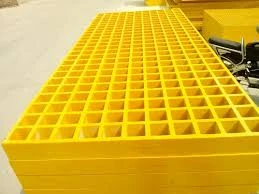loading...
- No. 9, Xingyuan South Street, Dongwaihuan Road, Zaoqiang County, Hengshui, Hebei, China
- admin@zjcomposites.com
- +86 15097380338
- Welcome to visit our website!
frp deck panels
Understanding FRP Deck Panels Applications and Advantages
Fiber Reinforced Polymer (FRP) deck panels have gained considerable attention in the construction and engineering sectors due to their unique characteristics and benefits. These panels are primarily made from a composite material that combines polymer resins with reinforcing fibers, making them lightweight yet highly durable. Over the years, their application has expanded, replacing traditional materials in various structural and architectural projects.
Applications of FRP Deck Panels
FRP deck panels are increasingly utilized in a range of environments, from commercial buildings to industrial facilities. Their primary use is in constructing floors, roof decks, and even bridge components. One of their most notable applications is in the construction of pedestrian walkways and vehicular bridges, where weight reduction is crucial without compromising structural integrity.
In addition to transportation infrastructures, FRP panels are commonly found in the water treatment sector. Due to their corrosion resistance, they are ideal for environments where materials are constantly exposed to moisture and chemicals. This durability significantly extends the lifespan of structures while lowering maintenance costs over time.
FRP deck panels are also used in recreational areas such as boardwalks and park pathways. Their slip-resistant surface properties make them a safe option for outdoor projects, ensuring that users can walk freely without the risk of slipping, even in wet conditions.
frp deck panels

Advantages of FRP Deck Panels
The advantages of FRP deck panels are numerous and compelling. One of the most significant benefits is their lightweight nature. Compared to traditional concrete or steel options, FRP panels are much lighter, which simplifies transportation and installation processes. This characteristic not only reduces labor costs but also minimizes the demand for heavy lifting equipment during installation.
Additionally, FRP panels exhibit excellent resistance to chemicals, moisture, and environmental degradation. Unlike metals that can rust or corrode and wood that can rot, FRP resists a wide variety of chemicals and is impervious to water intrusion. This resilience makes them suitable for a multitude of applications, particularly in harsh environments.
Another noteworthy advantage is the thermal insulating properties of FRP materials. They do not conduct heat as efficiently as metals, leading to energy savings in buildings due to reduced heating and cooling costs. The availability of various colors and finishes also enhances their aesthetic appeal, allowing architects to blend functionality with design seamlessly.
Conclusion
As the construction industry continually seeks more efficient, durable, and cost-effective materials, FRP deck panels stand out as a profound solution. Their versatility across various applications, along with a host of advantages ranging from reduced weight to enhanced durability, make them an appealing choice for both builders and engineers. As technology evolves and innovation in material sciences progresses, FRP deck panels are likely to become even more prevalent in the future of construction. Ultimately, investing in these panels can lead to significant long-term benefits while meeting modern structural demands.
-
The Rise of FRP Profiles: Strong, Lightweight, and Built to LastNewsJul.14,2025
-
SMC Panel Tanks: A Modern Water Storage Solution for All EnvironmentsNewsJul.14,2025
-
GRP Grating: A Modern Solution for Safe and Durable Access SystemsNewsJul.14,2025
-
Galvanized Steel Water Tanks: Durable, Reliable, and Ready for UseNewsJul.14,2025
-
FRP Mini Mesh Grating: The Safer, Smarter Flooring SolutionNewsJul.14,2025
-
Exploring FRP Vessels: Durable Solutions for Modern Fluid HandlingNewsJul.14,2025
-
GRP Structures: The Future of Lightweight, High-Performance EngineeringNewsJun.20,2025
